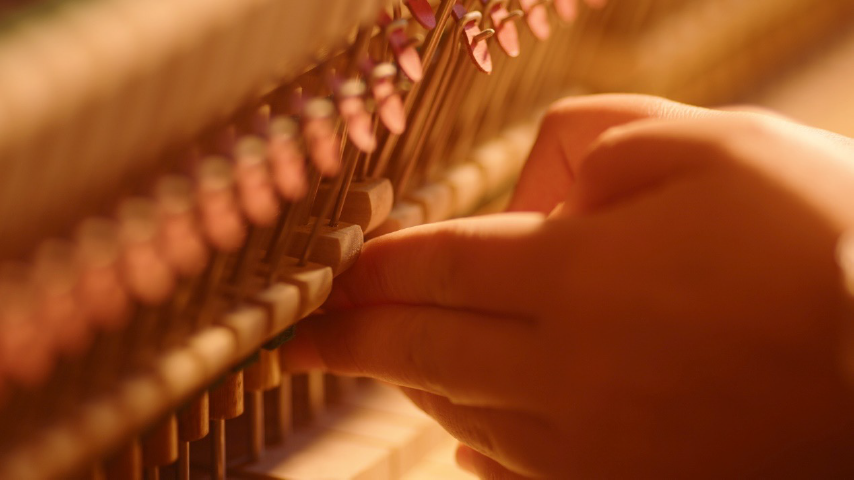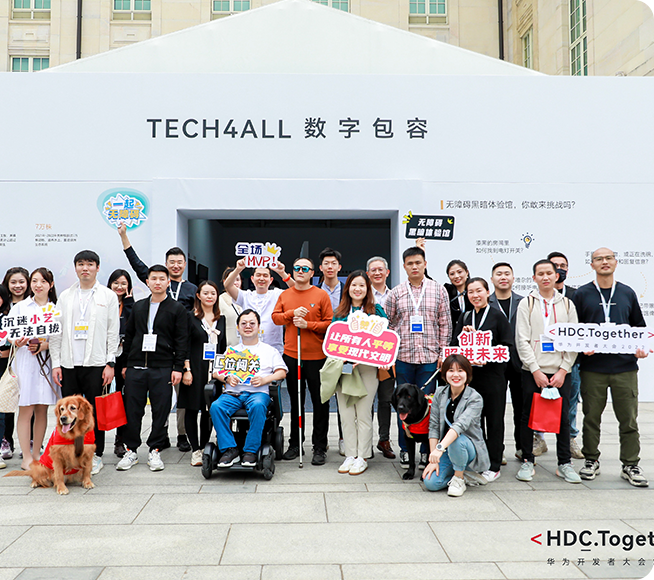
He Gang
Chief Executive Officer, Huawei Consumer Business Group
Technology is reshaping the world at an unprecedented speed, transforming every facet of work and life. Amid these changes, at Huawei Device, we have always upheld sustainable development as our core strategy. It is our belief that, ultimately, technological innovation should drive social equity, safeguard humanity, protect Earth's ecological balance, and promote sustainable use of natural resources.
To embody our commitment to corporate social responsibility (CSR), we remain steadfast in advancing four areas: digital inclusion, tech for good, environmental protection, and corporate responsibility.
Technology for everyone
We believe that technology should be for everyone. That is why we have designed our new HarmonyOS 6 to boast enhanced accessibility features. Beyond the fundamental yet crucial functionalities designed for individuals with visual or hearing impairments—such as ScreenReader, magnification gestures, and Celia Call—the system utilizes advanced AI foundation models to introduce innovations like Celia World View and Celia Voice Enhancement.
Our efforts towards inclusivity go beyond just our products, but rather shape how we interact with communities. We have collaborated with over 100 associations representing people with visual or hearing impairments throughout China to share accessibility knowledge and skills, empowering more than 13,000 individuals with impairments. In October 2024, we launched a sign language–based video service. Through this initiative, our sign language service engineers have helped troubleshoot device problems for over 20,000 hearing-impaired users.
HarmonyOS ecosystem, fostering extensive enablement and protecting health with digital solutions
Education and health are fundamental to achieving sustainability, and our long-standing dedication to these pivotal domains has never ceased.
Leveraging the inclusive HarmonyOS ecosystem, we have nurtured talent and shared cutting-edge technology. The HarmonyOS Workshop has garnered more than 7.32 million course enrollments, with over 400 universities and colleges partnering with us throughout this journey. To support more developers and creators in exploring and embracing their creativity within the HarmonyOS ecosystem, we launched the HarmonyOS App Developer Incentive Program 2025, offering a bonus pool exceeding CNY100 million to encourage HarmonyOS app release. In our HarmonyOS Innovation Contest 2025, a winner could even secure an incentive of up to CNY1 million.
Huawei continues to research and innovate in the field of fitness and health, and is committed to bringing digital health solutions to every person, home, and sector. HUAWEI Research, an innovative health research platform, has covered key fields such as cardiovascular, sleep, and respiratory health.
In July 2024, we launched the Light Up Your Rings campaign globally, encouraging more people to exercise and embrace wellness. To bring this vision to life, our HUAWEI Flagship Stores (HFS) served as hubs for fitness and health communities. Throughout 2024, the Huawei fitness and health team held more than 100 offline events, motivating participants to complete their Activity rings—Huawei's fitness tracking feature. These events resulted in over 200 million three-ring completions and acted as a stage for participants to push themselves to live a healthier lifestyle.
Eco-friendliness throughout the product lifecycle
Nature is the foundation of every product we design, driving innovation that sustains our planet. We have increased our investment in green materials, energy-saving technology, circular economy, and more, and are committed to providing greener products and services to help build a digital world that coexists harmoniously with Nature.
The most effective way to protect resources is by reducing consumption. Huawei Device uses 14 different types of sustainable materials, including paper, gold, copper, glass, and plastic, in its products. Our HUAWEI WATCH GT 5 uses 100% recycled nylon for the braided part of its Blue composite strap, while the HUAWEI WATCH D2 uses 100% recycled gold and copper for the flexible printed circuit (FPC) of its button.
Advancing technology and optimizing operations are crucial for helping businesses minimize their environmental footprint. In 2024, Huawei Device reduced its carbon emissions by 2.8% year-on-year through the introduction of clean and renewable energy sources. Our adoption of green warehousing and logistics solutions has led to an annual reduction of over 4,300 metric tons of carbon emissions. Notably, our Chengdu warehouse in China has earned the Level-1 Green Warehouse certification in the past year, while our Hefei warehouse, located in another city in China, has commissioned a 2-megawatt photovoltaics (PV) power station capable of generating 2 million kilowatt-hours (kWh) of electricity annually.
Partnership for a sustainable ecosystem
Sustainable development can be achieved only through collaboration with employees, partners, and society.
We have built diverse teams and created over 90,000 jobs, with more than 80% of the jobs outside China filled by local employees. We continuously optimize our global talent development system, delivering over 1.54 million hours of training in the past year to enhance the expertise of our staff.
We embrace the philosophy of "growing together with partners." During our supplier management, we have fully incorporated the CSR standards. We perform assessments on all potential suppliers to examine their CSR systems, and also require our suppliers to convey the same requirements to their own suppliers.
In addition to building strong teams, we strive to deliver reliable solutions that support society. We have continuously enhanced our comprehensive satellite communication capabilities, spanning from SMS messaging to satellite calling and to image messaging, in order to provide seamless connectivity options even without network coverage. Our HUAWEI Pura 70 Pro+ earned five stars and ranked first at the comprehensive evaluation of consumer-grade Tiantong satellite devices conducted by China Telecom, one of the world's largest telecommunications service providers.
Toward a sustainable future
Looking ahead, Huawei Device will build a fully connected, intelligent world based on HarmonyOS. We will collaborate with global users and partners to harness technological innovation as a driving force for sustainable development, building a seamlessly smart world that is fairer, healthier, and greener.
about sustainability

Information Accessibility
Huawei hopes that everyone can experience the benefits of technology.

Education and Health
Huawei products and services are designed to help people improve their digital skills and manage their personal health.

Environmental Protection
Huawei prioritizes the protection of our world and its natural resources above all else.

Corporate Responsibility
Huawei repays consumer, supplier, and community trust with responsibility.
Information Accessibility Helps People with Disabilities
Everybody has their own challenges that they must face in life. It takes courage to stand up and fight when those challenges feel insurmountable.
While there is no denying we must all find that courage within ourselves, we don't have to fight alone. Technology is one such tool that we can share to empower others, especially people with disabilities.
"I can't see the world, but I want the world to see me"
Former sailor athlete Cao Shengkang currently travels around the world with just a white cane, a backpack, and a pair of sunglasses. So far, he has visited 38 countries and 5 continents, including Mount Kilimanjaro.

A native of China's Anhui Province, Cao was hit by a speeding tractor which permanently damaged his eyes at the age of 8. Within just a few years, his eyesight continued to deteriorate until he was left completely blind.
"I felt like I lost the whole world." As he got older though, his drive to "see" the world led him far from home, with little more than his guide cane. It was at the top of steps of the Potala Palace, with the support of other climbers, that he found his calling.

"Smiles on people's faces can shed lights on the path forward for ourselves and others". Even though he could not see the world, he said, the world could see him. At the top of the mountain, he could stop and breathe in the fragrance of the mountain flowers. He also wanted to share his achievement with friends and family, and thanks to the Screen Reader feature that comes with Huawei phones. By connecting the phone to his smart glasses, he was able to discreetly listen to the phone's narration of what was on screen, making him just another bystander enjoying the view and documenting new memories.
"I live to feel the thundering of my heart"
Ho Li was born in the 90s and lives with hearing impairment. He has been an avid boxer since the age of 19. He trains for at least 4 hours a day, in the hopes of realizing his dream of becoming a boxing champion. During training, he selects the Boxing Mode on his Huawei watch, which collects his exercise data and offers smart recommendations accordingly. Thanks to his ceaseless training, he has achieved good results in various competitions.

"Although I'm deaf, I can feel my heart pounding when I'm boxing. I've been enjoying every day of my life", said Ho. Some say that you have to give up your dreams to survive. Luckily, this is not an issue for Ho, as he remains passionate in life and in his journey to pursue his dreams. He works as a food delivery driver to earn a living. Technology helps him a lot with his work.

The AI Subtitles feature on the Huawei phone converts voice messages to text. Live captioning can also be generated for living streaming.
What's more, this feature is also available during phone calls, converting the voice of the person on the other end of the call to text, and converting the text inputted by Ho into voice for the other person.
"Music just makes me happy. I can hear the slightest changes in pitch"
Bubbly Cai Qionghui is a professional piano tuner. Her ability to hear the slightest changes in pitch while adjusting the tension of piano strings makes her perfect for the job, even if her visual impairment prevents her from seeing the instrument itself.

"Pianos have 8,800 to 10,000 parts. Many have asked me how I could possible maintain a piano if I can't even see how all those parts fit together." But she has never let these doubts hold her back. After years of hard work, Cai is well recognized in her field, with a constantly growing list of steady customers.

She visits her customers with the help of her guide dog Aladdin, the Screen Reader feature, and voice assistant on her Huawei phone. While Aladdin keeps her safe on the road, her phone makes sure she is never led astray, always has an umbrella when it rains, and always knows where the closest mom-and-pop shop is for dinner.
At home, the phone's Tap to Connect feature also helps her instantly indulge in her passion for music, networking her vast musical library with speakers around her apartment.
"I intended to help the world better understand people with disabilities"

Peng Linqian is an up and coming entrepreneur who wants to help the world better understand people with disabilities, like herself.
The founder of a social work organization in Chongqing, Peng focuses on the educational needs of hearing-impaired teenagers. One of the project's many initiatives is an art festival to encourage children with disabilities to paint and unleash their imagination. Her "Big Thumb" Bilingual Classroom also provides professional resources for families with hearing-impaired children and was awarded first prize in the Sichuan-Chongqing Women and Children Public Welfare Project Competition.

Technology has played a huge part in Peng achieving her dreams. Her online public welfare lectures are subtitled using AI, bringing her conversations with her guests to more and more of the hearing impaired around the world.
Action is the key to success. Huawei has been taking action to invest continuously in information accessibility, which is a critical part of the company's sustainable development initiatives. Huawei hopes to create more accessibility services for people living with disabilities to improve their lives.
An Intimate Discussion on Accessibility at 2022 Huawei Developer Conference

Zheng Rui joined a group of other Huawei users today at Songshan Lake, Dongguan to attend the 2022 Huawei Developer Conference. These users were different than other attendees though – they are all software developers, who happen to have significant physical impairments.
Together, they met with Huawei Consumer Business Group's COO Kevin Ho to discuss how accessibility features in Huawei's consumer products are being developed to help people like them. Kevin said, "We work hard to make sure we prioritize 'less visible' features in our products, not just the flashy numbers on our products' stats sheets."

Connecting people with technology
Zheng Rui was born in 1989 and quickly diagnosed with Morning Glory Syndrome (MGS), a birth defect that changes the shape of the optic nerve. Zheng is completely blind in his right eye because of MGS and can only see shadows with his left eye. Despite this, Zheng's grew up sightseeing with his family as a child, and even managed to pass the Chinese college entrance examination with a 30x magnifying glass as his aide. In 2007 he was admitted to Shenzhen University's architectural design program, and he has lived in the southern Chinese city ever since.
According to the World Health Organization, more than 1 billion people around the world live with some form of disability. In China, 17 million people are impacted by visual impairments and 27 million people with hearing impairments, and 70 million people diagnosed with dyslexia.
As one of China's "physically impaired", Zheng Rui has spent years advocating for his peers in Shenzhen. He now serves as the Vice Chair of the Shenzhen Association for People with Visual Impairment and an official ambassador of accessibility services for the city of Shenzhen. He said, "Everybody lives with some difficulties or challenges, even if they present themselves in different ways." Last year, Zheng also volunteered to work at the Accessibility Exhibition Zone at Huawei Developer Conference 2021 to help show how the company is using smartphones to address such problems.

Zheng admits though, that he had some concerns about how he could read story books for his child. Luckily, Huawei phones come with the text recognition feature that helps him understand what the story is about.
Zheng tried the feature with one of his kid's favorite storybooks used to teach classical Chinese idioms, and use his own words to retell the story for his kid. "Because of my visual impairment, I can't just sit down with my kid and read them a book. This tool actually worked though, which enabled me to help him study more."
Tech for many and tech for the few
Another attendee who wore a plaid shirt and jeans, Zou Shiyong, stood out from his fellow software developers because of his faithful guide dog Liuliu.

Zou Shiyong was born in the 90s in a small mountain village. He was always fond of sports and electronic gadgets. When he graduated from the Wuhan School for the Blind, he stayed on to start teaching computer programming. After 9 years of teaching though, he decided to spread his wings and moved on to work for Huawei as an accessibility testing engineer. Today, his companion Liuliu together with a mobile navigation app and an advanced digital headset help him commute to work and navigate the bustling metropolis that is Shenzhen. At work, he helps test the accessibility features of Huawei phones to identify potential problems and come up with solutions.
His past experience proves to be highly valuable at Huawei. He encountered some difficulties at the early days of his new job, like many other new comers. However, he did not give up and keeps improving his capabilities.
Since he joined Huawei, Zou says the company has made massive improvements in its accessibility features. He is personally most proud of their reduction of screen reading latency by 1 full second. During his pre-release tests of HarmonyOS 3 in July, Zou noticed that the system suffered from frame freezes when using the screen reader function. Upon further analysis, he found that the function was conflicting with a touch recognition feature, resulting in certain gestures being misread. He and his colleagues were then able to optimize the feature and eliminate this conflict.
He said, "I am proud that Huawei has invested so much into this. By following their principle of "Tech for All", we have been allowed to focus on delivering outstanding user experiences for even very small, specialized groups of users."
Bright plans for the future
Kevin Ho also shared his own stories working on accessibility services at the meeting in Songshan Lake.
He added that even though the average consumer doesn't often think about, or even notice, many accessibility features, these services are important to Huawei because of the size of the impact they can have on even just a few users. He also discussed how it is important to Huawei that accessibility features are not just developed for the people that will use them, but also that they are developed by the people that will use them.
From a larger perspective, he explained, it is important to also increase the visibility of these features and the challenges they address. Everyone, at some point, is likely to suffer from at least a temporary disability at some point in their lives. A person recovering from a sudden illness could benefit hugely from the voice activated device controls Huawei's AI assistant Celia can provide. And everyone can benefit from other accessibility features on our phones as our eyesight and hearing degrade as we get older.
Kevin said Huawei sees information accessibility as an important part of the company's sustainable development initiatives. Huawei has committed to improving accessibility experiences by combining advancements in AI, software, and hardware through the HarmonyOS ecosystem. In addition, he said, Huawei has decided to offer open accessibility services and framework capabilities to its HarmonyOS ecosystem partners. This will equip other developers with the tools they need to make their own products and innovations more accessible to all.



